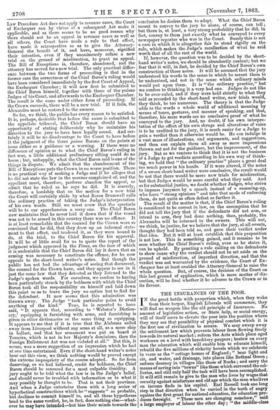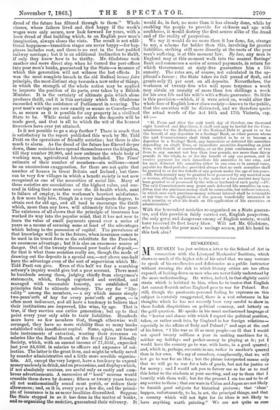THE INSURANCES OF THE POOR.
TN the great battle with pauperism which, when they wake 1 from their torpor, English Liberals will commence, they will find no weapon like the old principle of Insurance. No amount of legislative action, or State help, or social energy, will of itself servo to elevate the poor into the position where they may see that possibility of physical comfort which it is the first use of civilization to secure. We may sweep away the settlement law which prevents labour from flowing freely towards its natural market; reform the Acts which place aged workmen on a level with hereditary paupers ; bestow on every man the education which will enable him to educate himself, rebuild the five millions of ricketty hovels which we celebrate in verse as the " cottage homes of England ; " bear light and air, and water, and drainage, into places like Bethnal Green ; enforce decency in villages like those of Bucks ; and carry the means of saving into "towns" like those which surround the col- lieries, and still only half the task will have been accomplished. It will still remain to give to the man who lives by wages that security against misfortune and old age which the man who lives on income finds in his capital. Earl Russell took one long step in that direction when he carried in the teeth of angry squires the first grant for national education, for education pro- duces foresight. " These men are changing somehow," said a large employer of labour the other day ; " the middle-class dread of the future has filtered through to them." 'Whole classes, whose fathers lived and died happy if the week's wages were only secure, now look forward for years, with a keen dread of that building which, to an English poor man's imagination, always closes the vista. The result is not addi- tional happiness—transition stages are never happy—for hap- piness includes rest, and there is no rest in the best-padded railway carriage ; but it is an additional inclination to thrift, if only they knew how to be thrifty. Mr. Gladstone took another and more direct step when he turned the post-offices into poor men's banks, guaranteed by the State—a measure of which this generation will not witness the last effects. It was the most complete breach in the old Radical laissez faire principle, the most distinct step towards a new order of things, in which the strength of the whole nation may be applied to improve the position of its parts, ever taken by a British Minister. It is the certainty of ultimate gain which alone produces thrift, and it is this certainty which Mr. Gladstone succeeded with the assistance of Parliament in securing. The poor man's savings are now exactly as secure as Consols—that is, as secure as it is possible for any property in a civilized State to be. While social order exists the deposits will be made good, and that is all to which the wit of the keenest financiers have ever yet attained.
Is it not possible to go a step further ? There is much that is satisfactory in the report published this week by Mr. Tidd Pratt on the operations of friendly societies; but there is also much to alarm. As the dread of the future has filtered deeper down, those societies have spread themselves over the kingdom, till they number 20,000, and now embrace the whole body of working men, agricultural labourers included. The Times' estimate of their number of members—six millions—must be an unconscious exaggeration, for there are not quite that number of houses in Great Britain and Ireland ; but there can be very few villages in which a benefit society is not now recognised as one of the necessities of social life. Many of these societies are associations of the highest value, and suc- ceed in tiding their members over the ill-health which, next to failure of employ, is the workman's heaviest misfortune. A few more help him, though in a very inadequate degree, to obtain rest for old age, and all tend to encourage the thrift which, more than any laws, will ultimately fatten the poor. The existence of all shows that the principle of insurance has worked its way into the popular mind, that it has not now to learn the value of small payments spread over a series of years as a means of securing some at least of the advantages which belong to the possession of capital. The prevalence of that knowledge will be in the future; when insurance comes to be used in its truest form as the substitute for the Poor-law, an enormous advantage ; but it is also an enormous source of danger. Out of the twenty thousand poor banks of deposit,— for that is what these societies really are, though the mode of drawing out the deposits is a special one,—not above one-half have the advantage even of the sort of supervision which Mr. Tidd Pratt can give. Even of this half we fear a searching actuary's inquiry would give but a poor account. There must be hundreds among them, judging chiefly from clergymen's statements, which, though registered and certified, and managed with reasonable honesty, are established on principles fatal to ultimate solvency. The cry for " libe- rality" among the members, — a cry which means simply two-penn'orth of hay for every penn'orth of grass, — is often most indiscreet, and all have a tendency to believe that their institutions are improved, like wine, by age. That is true, if they survive one entire generation ; but up to that point every year only adds to their liabilities. Hundreds more have so few members that, though otherwise well arranged, they have no more stability than so many banks established with insufficient capital. Some, again, are turned into instruments of extortion, wasting their revenues on salaries like the Burial Branch of the Royal Liver Friendly Society, which, with an annual income of 77,3151., expended last year 35,6591. in salaries to officers and expenses of col- lection. The latter is the great item, and might be wholly saved by sounder administration and a little more sensible organiza- tidn. All, except the very largest, have a tendency to expend money uselessly in drink, and on processions, and displays which, if not absolutely noxious, are useful only as costly and cum- brous advertisements. A succession of " hard" seasons would crumble them down by dozens ; fifteen or twenty years hence all not mathematically sound must perish, or reduce their allowances; and, as it is, every year a few die, and the princi- ple of insurance is in as many localities discredited. Suppose the State stepped in as it has done in the matter of bank', and re-organizing the societies, guaranteed their solvency. It would do, in fact, no more than it has already done, while by enabling the people to provide for sickness and age with confidence, it would destroy the first source alike of the dread and of the reality of pauperism. We say it would do no more than it has done, for, strange to say, a scheme far bolder than this, involving far greater liabilities, striking still more directly at the roots of the poor man's suffering, is at this moment law. By law, any man in England may at this moment walk into the nearest Savings' Bank and commence a series of annual payments, in return for which Government at sixty-five guarantees him a life annuity. The rates are, of course, not calculated in the ap- plicant's favour ; the State takes its full pound of flesh, and grants only 2/,- per cent. on all deposits. Nevertheless, the workman of twenty-five who will spare tenpence a week may obtain an annuity of more than ten shillings a week for his own life and his wife's with a State guarantee. So little is this provision—which, if it were acted on, would alter the whole face of English lower-class society—known to the public, that the assertion will be distrusted, and we therefore quote the actual words of the Act 16th and 17th Victoria, cap. 45 :- "If. From and after the said tenth day of October, one thousand eight hundred and fifty-three, it shall and may be lawful for the Com- missioners for the Reduction of the National Debt to grant to or for the benefit of any depositor in a Savings' Bank, or other person whom. the said Commissioners shall think entitled to be or to become a depositor in a Savings' Bank, any immediate or deferred life annuities depending on single lives, or immediate annuities depending on joint lives, with benefit of survivorship, or on the joint continuance of two lives, to any amount not loss than four pounds, nor more than thirty pounds in the whole, to or for the benefit of any one person, and to receive payment for such immediate life annuities in one sum, and for such deferred life annuities either in one sum or in annual sums, payable for fixed periods ; provided always that no such annuities shall be granted to or for the benefit of any person under tho ago of ten years.
Such annuity may be granted to or possessed by any married man or woman, although an annuity to the same or a loss amount may have been granted to or possessed by the wife or husband of such party.—IV. The said Commissioners may grant such deferred life annuities on con- dition that the purchase-money shall be returnable, but without interest, in which case such purchase-money without interest shall be returnable at any time on the application of the person beneficially interested in such annuity, or after his death on the application of his executors or administrators."
With the benevolent societies re-organized on a State guaran- tee, and this provision fairly carried out, English pauperism, the only great and dangerous enemy of English society, would have received its first heavy blow. Will not Mr. Gladstone, who has made the poor man's savings secure, put his hand to this task also































 Previous page
Previous page